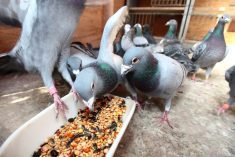The last of 38 cattle herds to be checked for bovine tuberculosis in a federal trace-out investigation across three provinces has been released from movement controls.
The Canadian Food Inspection Agency on Monday reported that a central Saskatchewan herd has now been released from controls which were imposed in December last year.
CFIA said in June it had completed the “trace-out” investigation stemming from the Nov. 9 confirmation of a TB-positive beef cow from a farm in B.C.’s southern Interior. A trace-out involves finding and testing all herds that received animals in the past five years from an infected herd.
Read Also

Trump tariff on Brazilian goods could jack up U.S. burger price
U.S. President Donald Trump’s plan for a 50 per cent tariff on goods from Brazil will likely raise prices for the beef that is used in American hamburgers, traders and analysts said on Thursday, as food manufacturers increasingly rely on imports during a time of declining domestic production.
The agency’s probe led investigators to find three more TB-positive cattle in the same B.C. herd. The trace-out also led to TB testing and movement controls for 15 other B.C. cattle herds, along with 22 in Alberta and the one in Saskatchewan.
The infected B.C. herd, meanwhile, was depopulated and no other infected animals have yet been found.
The “trace-in” investigation — in which all herds that provided animals to the infected herd are tracked down and tested — is to begin this fall, CFIA said, to try to “identify and eliminate the source of the disease,” if possible, and “to prevent any potential spread of the disease.”
All four infected animals from the B.C. farm carried the same strain of bovine TB, which CFIA said is distinct from any cases previously detected in Canadian wildlife or domestic livestock — and unrelated to past cases of bovine TB seen in Alberta, B.C. and anywhere else in Canada.
The U.S. Department of Agriculture has also confirmed the strain was never previously identified by its laboratory service, CFIA said.
The agency also ruled out the unusual strain from its most recent previous investigation, which involved six cattle confirmed infected in 2016 from a southern Alberta operation. That strain was found to be “closely” related to a strain originating from cattle in central Mexico in 1997.
That investigation closed in May last year with no source of infection ever identified.
CFIA has previously emphasized there is no risk to Canada’s food supply or to human health from this case.
Human exposure to bovine TB can only occur through the passage of fluids from an animal to an open skin sore, through “extended close contact” with an animal with active respiratory TB or by drinking unpasteurized milk from an infected animal. — Glacier FarmMedia Network















